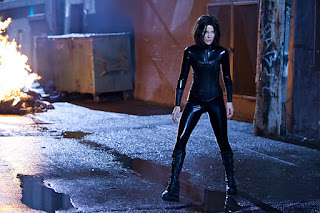GIANT ROBOTS VS MONSTER ALIENS IN “PACIFIC RIM”
I love Del Toro's directing when he did Hellboy: The Golden Army. I am expecting the same kind of directing in Pacific Rim
 |
| Photo courtesy of Warner Bros. |
Director Guillermo Del Toro (“Pan's
Labyrinth,” “Hellboy”) was largely responsible for shaping what are, literally
speaking, the biggest stars of Warner Bros. And Legendary Pictures' action
adventure “Pacific Rim”: the monster aliens aka the Kaiju.
“I
love monsters,” states the director who conceived all the various monsters in
the film in conjunction with an elite band of concept artists, illustrators,
sculptors, and designers. “We had some of the best creature designers in the
world involved in the making of the Kaiju.”
Del
Toro began with a group that included artist and illustrator Francisco Ruiz
Velasco, Wayne Barlowe, Stephen Schirle, Doug Williams, Hugo Martin, Tyruben
Ellingson, Guy Davis, Oscar Chichoni, David Meng, Simon Lee, Raul Monge, Carlos
Salgado, Keith Thompson, Simon Webber, Allen Williams and Rob McCallum.
Members
of the team brainstormed for weeks, beginning in a windowless room they
appropriately dubbed “the submarine.” Together, they examined everything: from
sizes, shapes and colors to how the immense beings moved and fought. Del Toro
says, “We wanted to evoke the sheer awe and terror that one would feel when
coming upon one of these monsters.”
He
set down certain parameters: an example being that any animal kingdom
inspirations were primarily limited to lizards, crustaceans and insects. For
the most part, however, the think tank could let their imaginations run wild,
taking a tag team approach as they pooled ideas.
The
designers gave the Kaiju different nicknames that were indicative of their most
prominent physical attributes, like Knifehead, Axehead, Leatherback, etc. Some
are viciously calculated, others are more raw power. “They are living weapons,”
del Toro says. “They are blind instinct combined with tactical intelligence,
capable of making instant decisions in battle, so there are definitely a few
surprises.”
Making
them even more fearsome, every appendage on the Kaiju bodies is part of their
arsenal. And, as Thomas Tull points out, “They are quickly evolving. With every
attack, they learn something and continually progress in both size and
tactics.”
Many
of the same artists who helped bring about the Kaiju also lent their talents to
the formation of mankind’s last line of defense: the giant robots or Jaegers.
Screenwriter
Travis Beacham says, “The biggest challenge in the world of ‘Pacific Rim’ is
finding a way to beat the Kaiju on their own terms. That was the whole idea
behind the invention of the Jaegers.”
Just
as every Kaiju is unique, each Jaeger is distinct in both design and function,
with its own array of weapons, “so every time you see a Jaeger go up against a
Kaiju, it’s a completely different fight,” says del Toro.
The
once mighty Jaeger fleet has been reduced to four surviving robots. The
director wanted the huge war machines to appear combat-worn, with markings that
flaunt the number of enemies downed. Their shape, color and insignias reflect
their country of origin, as do their fighting styles.
Del
Toro equates the look of the U.S. of A.’s Gipsy Danger to “a classic gunslinger
heading into a fight. A mixture of a deco skyscraper and John Wayne. Gipsy has
swagger and is made to resemble a WWII fighter jet in paint job and details.” A
Mark 3, it is considered an old Jaeger and, although it’s been refurbished, it
still carries the scars of war…as do its pilots.
Russia’s
Cherno Alpha is a T-series Jaeger with an oversized nuclear reactor. Its
exceptional brawn makes up for its more lumbering gait. It is the oldest,
heaviest Jaeger in the surviving fleet. “Brute force and blunt trauma are its
calling cards,” says producer Thomas Tull.
China’s
Crimson Typhoon is a Mark 4, the only Jaeger with three arms, thanks to its
three-man pilot team. Its moves are as close as a massive Jaeger can get to
martial arts. Jon Jashni observes, “Some of what they’re able to pull off in
the course of the movie is a function of them being able to do more with more.”
The
Resistance has one Mark 5: Australia’s Striker Eureka. Being the latest model,
it boasts faster speed and better maneuverability. “But it’s an Aussie brawler,
so it has a lot of bravado and a bit of a strut, like a guy who would pick a
fight in a bar,” del Toro teases.
Although
the Jaegers would exist only on screen, a great deal of planning went into the
mechanics of the robots. “From a technical standpoint, we decided to build them
from the inside out in diagrams,” reveals del Toro. “We determined the way the
pistons, the relays, the torque, the transmission, the engines, and every other
element worked in detail. Then we pulled back and started figuring out the
vents, the thermal insulation, the outer skin and so on.”
Opening
across the Philippines in July 11
in IMAX 3D, Digital 3D, 2D and regular theaters, “Pacific Rim” is distributed
by Warner Bros. Pictures, a Warner Bros. Entertainment Company.


Comments
Post a Comment